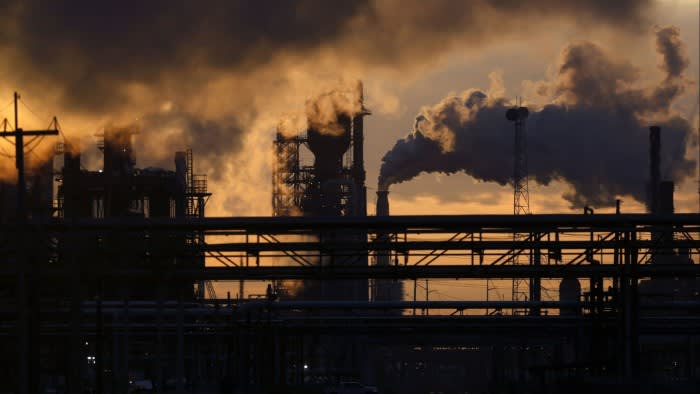Stay informed with free updates
Simply sign up to the Climate change myFT Digest — delivered directly to your inbox.
Big investors in Shell, including Amundi and Axa Investment Managers, have urged the fossil fuel producer’s other shareholders to send a “strong signal” to the oil and gas industry by backing their resolution seeking greater climate action.
The 27 shareholders, who collectively own about 2.5 per cent of Shell, have filed a resolution ahead of this month’s annual meeting that calls on the company to align its “medium-term” greenhouse gas emissions target with the Paris Agreement on limiting global warming. Global emissions must fall by almost half by 2030 for those targets to be met.
Shell has recommended shareholders vote against the resolution, saying its current “targets and ambitions” were sufficient, but in a letter to shareholders that was sent on Thursday, the investors rejected this and warned that meeting the Paris goals was “essential to preserve the health of the global economy”.
The resolution, filed in January, and Thursday’s letter mark the most significant shareholder push to date on climate policy at the oil and gas group and comes at a time of increasing divergence between investors over climate risks.
In the Paris Agreement, countries agreed to limit global temperature rises to well below 2C, and ideally to 1.5C, above pre-industrial levels. Last year was the hottest on record.
“This year’s vote is especially important as Shell has recently backtracked on its climate targets, doubling down on its determination to continue oil and gas extraction,” says the letter, which was co-ordinated by green investor group Follow This.
“Now is the time to send a strong signal to the industry that investors are determined to reach Paris.”
Last year, Shell chief executive Wael Sawan rolled back a target to cut oil production, instead arguing the company needed to continue investing in oil production while growing its gas business.
Shell aims to cut absolute emissions from its own operations — also known as scope 1 and scope 2 emissions — by 50 per cent by 2030, compared with 2016. Earlier this year, it set an “ambition” to reduce absolute scope 3 emissions, which are those from the oil products it sells, by 15-20 per cent by 2030, compared with 2021.
In its notice of its annual meeting, Shell’s directors said the company’s “targets and ambitions” were in line with the Paris Agreement. The business was “making good progress towards achieving these targets and ambitions”.
But in the letter, the investors argued that the oil and gas company’s assertion that its targets were aligned with the Paris Agreement was “unfounded”, adding that the company’s directors would have supported the resolution if that were the case.
Glass Lewis, the influential proxy adviser whose recommendations are used by many investors, said shareholders should vote against the climate resolution.
“Given the company’s existing [greenhouse gas] reduction goals, and its extensive disclosure on the steps it is taking to mitigate its environmental impact, as well as insufficient evidence that would lead us to believe it is significantly lagging its peers, we do not believe that adoption of this
proposal would benefit the company or its shareholders,” Glass Lewis said.
The vote at Shell later this month is the only chance investors will have this year to push oil and gas companies to align with the Paris Agreement, after Follow This withdrew a motion at Exxon when the US oil and gas giant sued the investor group.
“All oil majors will look to see what happens at Shell,” said the letter, which is being sent to almost 2,000 investors, including big shareholders.
Follow This has filed resolutions at Shell since 2016, but this year’s motion has received the largest backing from investors.
Last month, Dutch investor MN said it would vote in favour of the resolution. MN leads the engagement with Shell on behalf of investor alliance Climate Action 100+.
Shell was in court last month to appeal against a landmark ruling that ordered it to cut emissions. In a filing to the court, Shell said it would not reduce its total scope 3 emissions between now and 2030 due to growth in liquefied natural gas.
A spokesperson for Shell, which is due to publish its first-quarter results on Thursday, said LNG would “play an important role in the energy transition”, as well as for energy security.
Investments in carbon capture and storage, hydrogen and renewable energy would help it produce LNG with lower carbon intensity in the future, Shell added.
Additional reporting by Brooke Masters


